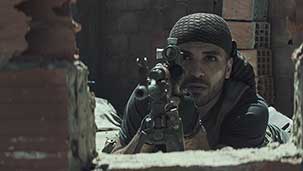Great action movies demand great villains. What fun is a hero that parachutes into trouble, eliminates enemies with ease, and never once feels legitimately challenged? Hollywood has known this forever – and Clint Eastwood knows Hollywood. More importantly, he knows America. That’s important. As much as the “Sniper” part of this film might be the differentiator, it’s actually the ultra-classic “American” shooting style that makes the film work.
Which includes manufacturing and dispatching a parallel villain like you.
Now before you cry “spoiler alert!”, let me reiterate the American-ness of this film. America comes first in the title, and first for Eastwood. Failure is not an option, and ambiguity is not a strong suit of big studio films – especially old fashioned heroic myth-making like this one. Though I think they tried (more on that in a moment).
Based on the autobiography of American NAVY Seal Chris Kyle, credited with over 150 confirmed kills (and maybe a 100 more), this is the story of the deadliest sniper in American history. From the moment the novel was published (or planned, in fact), it was impossible that this story wouldn’t become a feature film. The question was, would it be another chest-pumping Lone Survivor, a politically detached Zero Dark Thirty, or something in between? The first scene handles that question rather well, actually.
Positioned on a rooftop in Iraq, your counterpart Kyle (played by a wildly bulked-up Bradley Cooper), is trying to decide whether or not to kill a “military-aged” man who is casually watching U.S. soldiers and making a phone call. See, unlike those easy target Americans you get to pick off, Al-Qaeda members don’t wear uniforms. So the deadly decision is Kyle’s alone to make. There’s also a woman and her young son below, who look like they’re handling a bomb and approaching the military convoy. Kyle’s spotter reminds him how, if he makes the wrong call, he’ll be shipped back to bootcamp (or something like that). Finger on the trigger, the story cuts away to life in America - pre-NAVY Seals, and pre-9/11 – to when Kyle was just a proud, rootin’ tootin’ Texas cowboy. Living the dream.
That’s actually a line in the film.
There’s more where that comes from. Rodeos, beer and fistfights are used less for character building than for familiar texture to cleanse our palette from the (other) dusty sand bowl of the Middle East, where most of the film takes place. Flashing back even further to when Kyle was a kid, we get some schoolyard bully scenes, child stoicism, and daddy issues. All text-book biopic back story. Maybe it’s true, maybe it’s not. It doesn’t matter. When Americans want to go to war (in a movie or otherwise), they know how to set it up to get the public on their side.
And viewed through the lens of classic American filmmaking, American Sniper actually hits all the required emotional beats with surprising ease and deftness. The cinematography is clean and easy to follow (with the notable exception of the finale), and the details seem to matter – from always having mud on the muzzle to wearing out the paint on the scope. It would be a little too easy for someone like me, or you, to stick a big target on this film and shoot it down for flag-waving patriotism. After all, the script at least introduces characters conflicted by the morality of their decisions (not you of course – the villain must stand for evil as truly as the hero stands for good).
A more daring director might have taken cues from the script more seriously in the way it handled you. Making you a former Olympic champion does imbue a broader sense of accomplishment and humanity. But I can’t help but feel the conclusion was more wish fulfillment on Kyle’s part than objective resolution. Despite the textual evidence for that possibility, Eastwood wouldn’t dare deprive his American audience of the money shot.
Ultimately, American Sniper gets to be a little bit of everything for all people: a pure recruitment tool for the army, proof of the psychological consequences of war for pacifists, and an emotionally charged drama for the general public.
And for everyone on your side, probably just one more reason to hate America.
Sincerely,

Christopher







